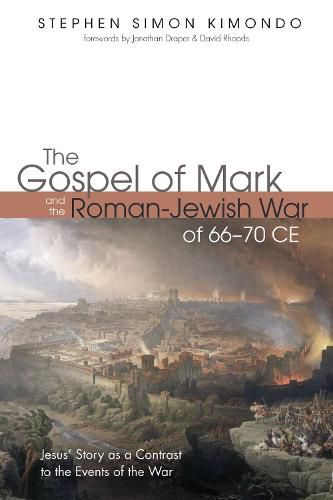Readings Newsletter
Become a Readings Member to make your shopping experience even easier.
Sign in or sign up for free!
You’re not far away from qualifying for FREE standard shipping within Australia
You’ve qualified for FREE standard shipping within Australia
The cart is loading…






This title is printed to order. This book may have been self-published. If so, we cannot guarantee the quality of the content. In the main most books will have gone through the editing process however some may not. We therefore suggest that you be aware of this before ordering this book. If in doubt check either the author or publisher’s details as we are unable to accept any returns unless they are faulty. Please contact us if you have any questions.
This book interprets Mark’s gospel in light of the Roman-Jewish War of 66-70 CE. Locating the authorship of Mark’s gospel in rural Galilee or southern Syria after the fall of Jerusalem and the temple, and after Vespasian’s enthronement as the new emperor, Kimondo argues that Mark’s first hearers–people who lived through and had knowledge of the important events of the war–may have evaluated Mark’s story of Jesus as a contrast to Roman imperial values. He makes an intriguing case that Jesus’ proclamation as the Messiah in the villages of Caesarea Philippi set up a deliberate contrast between Jesus’s teaching and Vespasian’s proclamation of himself as the world’s divine ruler. He suggests that Mark’s hearers may have interpreted Jesus’ liberative campaign in Galilee as a deliberate contrast to Vespasian’s destructive military campaigns in the area. Jesus’s teachings about wealth, power, and status while on the way to Jerusalem may have been heard as contrasts to Roman imperial values; hence, the entire story of Jesus may have been interpreted an anti-imperial narrative.
$9.00 standard shipping within Australia
FREE standard shipping within Australia for orders over $100.00
Express & International shipping calculated at checkout
This title is printed to order. This book may have been self-published. If so, we cannot guarantee the quality of the content. In the main most books will have gone through the editing process however some may not. We therefore suggest that you be aware of this before ordering this book. If in doubt check either the author or publisher’s details as we are unable to accept any returns unless they are faulty. Please contact us if you have any questions.
This book interprets Mark’s gospel in light of the Roman-Jewish War of 66-70 CE. Locating the authorship of Mark’s gospel in rural Galilee or southern Syria after the fall of Jerusalem and the temple, and after Vespasian’s enthronement as the new emperor, Kimondo argues that Mark’s first hearers–people who lived through and had knowledge of the important events of the war–may have evaluated Mark’s story of Jesus as a contrast to Roman imperial values. He makes an intriguing case that Jesus’ proclamation as the Messiah in the villages of Caesarea Philippi set up a deliberate contrast between Jesus’s teaching and Vespasian’s proclamation of himself as the world’s divine ruler. He suggests that Mark’s hearers may have interpreted Jesus’ liberative campaign in Galilee as a deliberate contrast to Vespasian’s destructive military campaigns in the area. Jesus’s teachings about wealth, power, and status while on the way to Jerusalem may have been heard as contrasts to Roman imperial values; hence, the entire story of Jesus may have been interpreted an anti-imperial narrative.